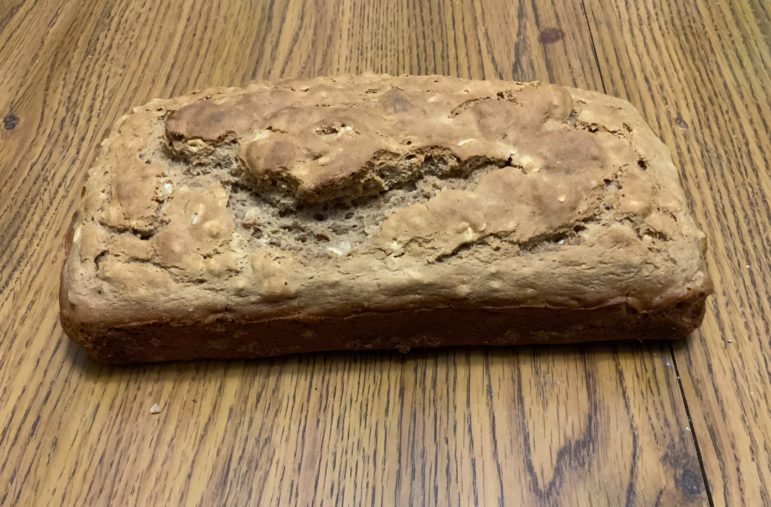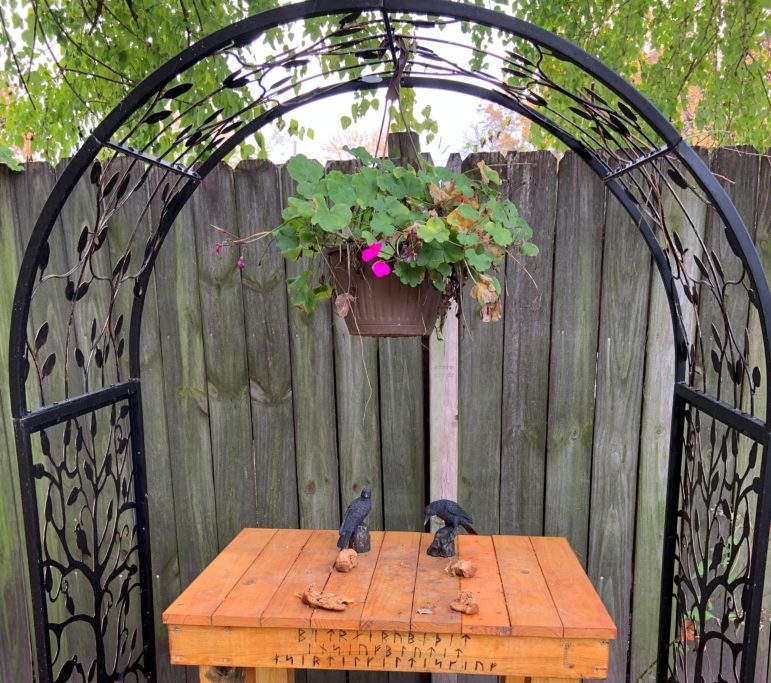
First, mix together the dry ingredients: equal amounts of white flour and wheat, some rolled oats, and then a bit each of baking soda, baking powder, salt, and Splenda. Then take a bottle of whatever hard apple cider happens to be at hand and pour it into the dry ingredients. I first made it with a can of Bloom Cider, which I found in a state-owned liquor store in Ogden, Utah.
Mix this up — Irma Rombauer, from whom I freely adapted this process from her recipe for quick beer bread, says to “fold just until the dry ingredients are moistened” in my 1997 copy of The Joy of Cooking. Pour the mixture into a greased loaf pan and bake it at 400 degrees for 36 minutes. (Irma says 35-40, but my oven always seems to run a little hot.) Then let it cool, though not for too long. Like all bread, it tastes best warm.

A fresh loaf of Eric’s cider bread [E. Scott]
This cider bread, due to using baking soda as its leavening agent instead of yeast, remains dense and a bit cake-like in its texture. The apple cider leaves a ghost of flavor behind, mostly found in the nose, but still recognizably autumnal. Irma suggests adding cheese and scallions to the mix, but I have not tried this yet. I am still dubious enough about making my own bread at all, even a recipe as quick and simple as this, and I suspect I will need to make it a few more times before I trust in its alchemy.
When the bread is cool, I cut it in half. One half gets wrapped in foil; for the rest of the week, I will cut thick slices of it to eat warm with butter for my breakfast. I take the other half in hand, along with a lantern and an offering bowl, out into the backyard. I walk to the shrine I built at the far end of the yard earlier this summer and set the bread down on the table there. It is midnight on a Wednesday evening, which is the time I like to bring gifts to the gods. I tear the cider bread into nine pieces and leave it there. In the morning the bread is gone, taken by the gods or the squirrels, who in any event share much in common.
This is now my weekly ceremony, my tribute to the gods. I had been thinking about doing something like this for some time now, since a conversation with my fellow second-generation polytheist Kaye Boesme on Twitter about ways to quickly make devotional bread. But I think there is more to this addition to my practice than I have acknowledged, even to myself.
Last May, I was diagnosed with type-two diabetes. This was not entirely unexpected. My grandfather had it, and my father has it, and so I suspected I would have it eventually, too, though I had hoped it would wait until I was at least in my forties. My case is not severe, or not yet, anyway. I check my blood sugar every morning before breakfast, and I take a pill; I don’t have to inject myself with insulin, and, for the most part, I have been keeping myself beneath my target number. Truth be told, I am a little grateful for the diagnosis – it gave me a reason to change my habits that couldn’t be argued with.

Some pieces of cider bread laid out as an offering on the author’s backyard shrine [E. Scott]
Most of those habits surrounded food, naturally. In my day job, I spend a lot of time driving around southern Illinois, and as a result, I ate a lot of meals out of fast-food restaurants and gas stations. I drank a lot of Coca-Cola and treated myself to a lot of Reese’s Cups. Now, I am on the road just as much as before, and still need to eat – and lo, the market doth provide, offering Coke Zero and Zero Sugar Reese’s Cups, the latter available at merely three times the price. I developed diabetes in large part because I indulged too often in these cheap and unsustainable offerings; now, capitalists are only too happy to sell me solutions to diabetes that look exactly the same as the things that caused it. Alternatively, I can try to buy my way out of diabetes through any of the dozens of cookbooks with titles like The Diabetic Cookbook for the Newly Diagnosed or The All-Natural Diabetes Cookbook or, getting most directly to the point, The How Not to Die Cookbook.
Navigating all of this has been paranoia-inducing, and, like many people with new diagnoses, my first reaction was to think that every part of my life would have to change, that I could never again eat a slice of white bread, much less a slice of cake. And so it is no surprise to me that I have turned to baking this weekly loaf of bread at this time in my life, although I did not know that consciously when I first began to do it.
I missed the great bread baking wave that many people were caught in during the initial months of the pandemic, when, so the stories go, everyone became desperate for a sourdough starter, but now I understand the urge. There is powerful magic in creating something destined for sacrifice, something that is meant to be shared with the gods and then left to them. There is also powerful magic in making deliberate choices about what foods I make and consume. When I bake bread for my gods, I am conscious of this magic, of how baking changes a collection of disparate things into something else entirely, something as different as lead is from gold.
Eric’s Apple Cider Bread
Based on “Quick Beer Bread” from The Joy of Cooking, 6th edition, Irma Rombauer.
Ingredients
- 1 cup sprouted wheat flour
- 1 cup all-purpose flour
- ½ cup old fashioned rolled oats
- 2 tablespoons Splenda (or sugar)
- 2 teaspoons baking powder
- ½ teaspoon baking soda
- ½ teaspoon salt
- 12 ounces hard apple cider
Preheat the oven to 400 degrees. Grease a six-cup loaf pan and set it aside.
In a large bowl, mix together the dry ingredients, then pour in the cider and fold in until the dry ingredients are moistened. Scrape the batter into the loaf pan and spread evenly, then bake in the center of the oven for 35-40 minutes, until a knife inserted all the way to the bottom of the pan comes out clean. Let the bread cool in the pan for 5-10 minutes, then pop it out of the pan and let it cool completely. (Or go ahead and eat some, it’s best when it’s warm. That’s how the gods like it, too.)
The Wild Hunt is not responsible for links to external content.
To join a conversation on this post:
Visit our The Wild Hunt subreddit! Point your favorite browser to https://www.reddit.com/r/The_Wild_Hunt_News/, then click “JOIN”. Make sure to click the bell, too, to be notified of new articles posted to our subreddit.